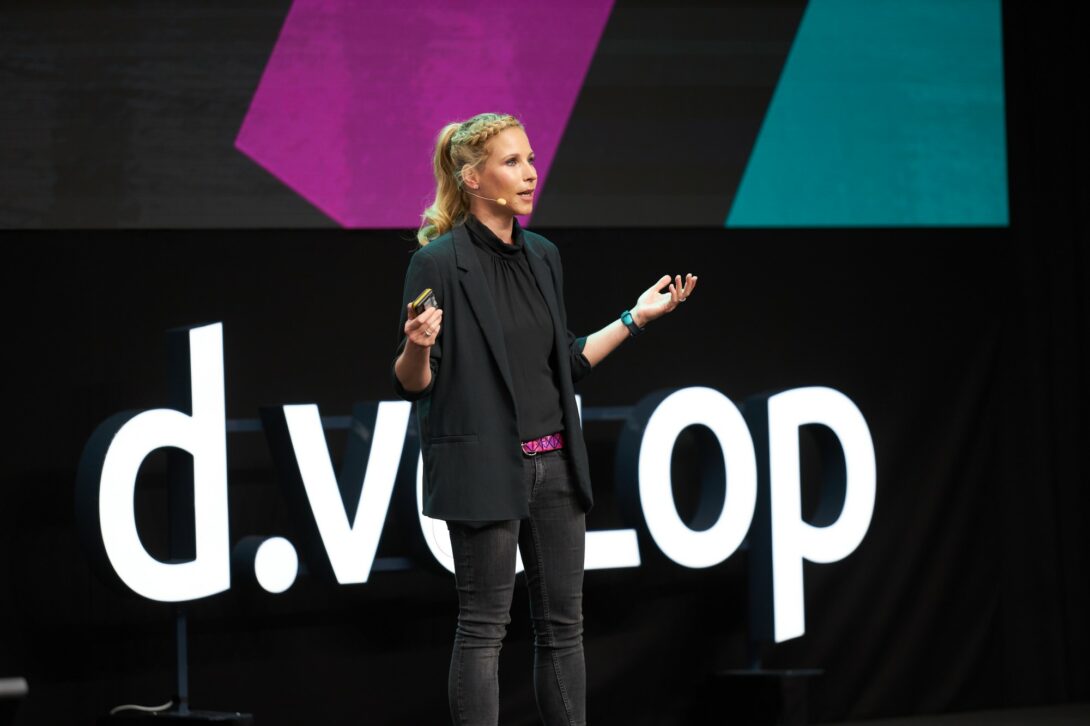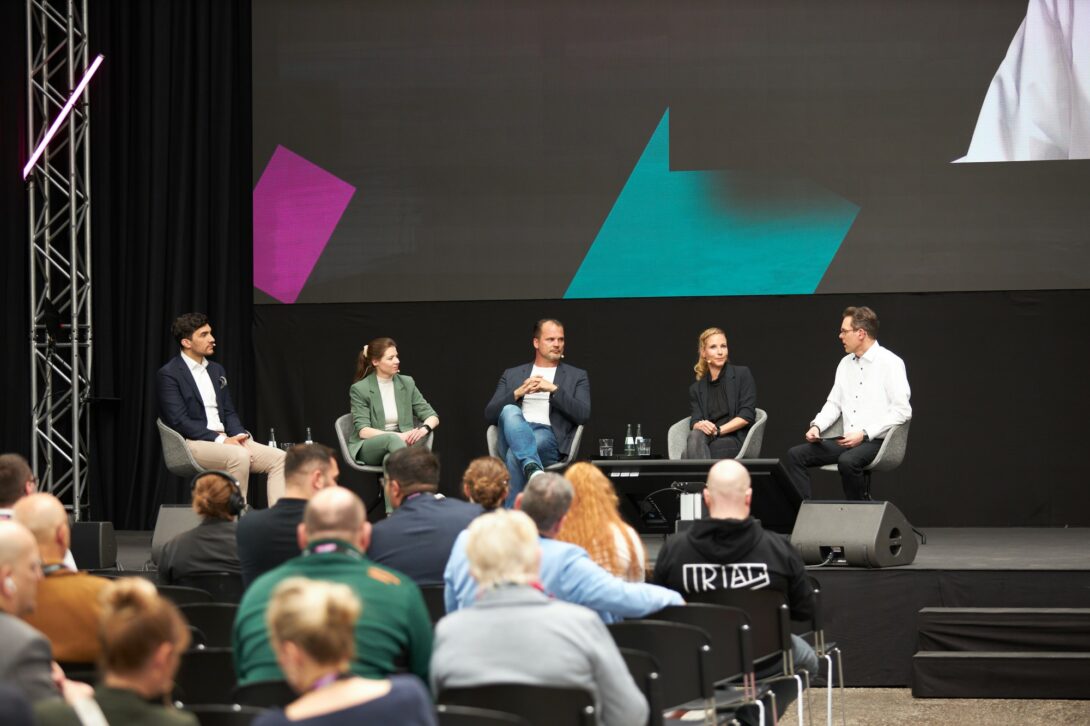In today’s digital world, companies are increasingly required to face the challenges of digitalisation and adapt their working methods accordingly. Fränzi Kühne, Chief Digital Officer at edding and founder of TLGG, is an expert in this field. She recently gave a talk at the d.velop forum entitled “Mastering Digital Transformation: How New Work and Digitalisation Really Work in Companies.” In a subsequent interview, she shares her experiences and insights on the topics of digitalisation, leadership skills and work-life balance.
The diverse world of Fränzi Kühne
d.velop blog: How would you describe who you are and what you do to someone who doesn’t know you?
Fränzi Kühne: My name is Fränzi Kühne, I am CDO at edding, founder of TLGG, I am on the supervisory board of Württembergische Versicherung, on the board of trustees of the Allbright Foundation and have various other roles. And I am a mother of two children.
d.velop blog: You have many roles. Which of these roles excites you the most and why?
Fränzi Kühne: I have the most passion and enthusiasm for my children and my family. That’s why it’s like this: When it comes to priorities, my family is always at the top. After that comes my career, then comes me, then comes my relationships.
This is a four-step system that I have. Ideally, the priority is there, but if I notice that I’m not feeling well in the moment, then I move up and have to focus on that. When you act in so many different roles, you can’t give 100 % and be there everywhere and that’s why I try to prioritise myself time effectively.
The importance of digitalisation
d.velop blog: Please complete the sentence: For me, digitalisation means…
Fränzi Kühne: Change.
d.velop blog: That is very succinct. How important do you think it is for companies to participate in digitalisation?
Fränzi Kühne: Companies that haven’t started yet or are still struggling to start change are lost in my eyes. Maybe they are not lost now, but at least in the next 3 to 5 years they will be completely left behind.
Companies that haven’t started yet or are still struggling to start change are lost in my eyes.
Fränzi Kühne
It’s an incredibly long road to transformation, to a culture of change. That’s why you have to start early on to build a culture that can support this. It’s not about establishing “we’ll do a bit of SharePoint somehow”.
Digital document management explained 🚀
Templates, best practices, tips and tricks for a digital document management system.
Leadership skills in the digital world
d.velop blog: Which skills are particularly important for managers in the digital world, and how can they develop these skills?
Fränzi Kühne: I think managers have to be incredibly resilient in a digital and constantly changing environment in order to be able to deal with the pressure and changes. They have to be incredibly great role models, role models in the sense of good management and good leadership. This includes being able to listen and bringing different teams together to allow for different opinions. It’s not always about finding the best compromise, but rather making the best decisions.
It’s not always about finding the best compromise, but rather making the best decisions.
Fränzi Kühne
Work-life balance: The importance of a balanced working time
d.velop blog: “We should work 100 hours more a year.” This is what the head of the German Institute for Economic Affairs (IW), Michael Hüther, recommends. On the other hand, around 81 percent of full-time workers want a four-day week. What is your opinion on this subject?
Fränzi Kühne: Of course, I work in job sharing, I’m employed 55 % of the time at edding. I wouldn’t have taken the job if it had been a normal 40, 60, 80-hour board job.
Work-life balance is what people want. This also applies to older people, if they have the courage to admit it in a leadership position. My experience has been that men who are at the end of their careers often say, “My biggest regret is not spending more time with my children.” And who wants to say that at the end of their life? And what kind of person are you to ban something like that? So, all companies that don’t allow this will lose the battle for skilled workers and talent.
d.velop blog: What impact do you think digitalisation has on the work-life balance of employees?
Fränzi Kühne: I believe that it can have pretty good effects if you are able to manage yourself independently. This requires a lot of self-discipline. Additionally, the willingness to take responsibility for yourself, in order not to get lost in the middle of all these hybrid working methods and constant availability. In my opinion, good self-management is the be-all and end-all in order to reap the benefits of digitalisation.
Diversity and inclusion: A success factor for companies
d.velop blog: How can companies ensure that they promote diversity and inclusion during digital transformation?
Fränzi Kühne: So, assuming that it is clear to everyone that diverse teams make a good contribution and that companies that have diverse teams are more economically successful, it has to be anchored at the top.
This belief must be demonstrated by management. It’s not a yes, “We now have the women’s quota” or we’ll do a little something for diversity as a wall sticker. It really has to be lived. Otherwise, the people you bring in will identify it immediately and then leave again. How much does this cost in recruiting? Yes, it’s actually really easy to understand.
It’s not a yes, “We now have the women’s quota” or we’ll do a little something for diversity as a wall sticker. It really has to be lived.
Fränzi Kühne
But it also has a lot to do with giving up power and working and thinking differently. You are no longer the smartest person in the room, as it was 10 or 20 years ago, or as it still is in many companies today.
“What men are never asked”: A look at gender roles
d.velop blog: You wrote a SPIEGEL bestseller: “What men are never asked”. What can readers expect?
Fränzi Kühne: It put the discussion about the gender debate in Germany in a different light. Which is not Alice Schwarzer-like, pointing fingers and so strongly unsympathetic feminist, but rather approaching the topic in a light way.
Figures show that men don’t buy books by female authors and so women buy this book and then put it on their husbands’ desks to talk about it. That’s why it’s good and easy access to this topic, which is extremely important.
d.velop blog: What was the decisive impulse for writing this book?
Fränzi Kühne: Good question. Actually, it was just a pastime project because I actually had other plans: namely, going on a trip around the world with my family. And then I was bored with Corona and thought to myself, I should talk to a publisher like that.
They wanted me to write a biography about myself and I thought, I’m in my mid-30s. I’m not writing a biography. Who am I?
Then I came up with the idea of how successful men actually react to questions like the ones I was asked. When I had to ask the questions myself in this project, which are sometimes incredibly embarrassing, I realised how absurd it actually is.
And starting a whole discussion about what the media image of a woman actually is reveals a lot and I really like that.
Create more space for yourself through process digitalisation 💻
d.velop blog: What do you think needs to change? Do you think digitalisation can help with this?
Fränzi Kühne : I find it difficult to say that in general terms. On the one hand, digitalisation can promote the whole topic of compatibility because you can work regardless of location. Companies have noticed that you no longer have to be present in the company to be able to lead.
Today, leadership is still often confused with being present. I believe that Corona has changed that and this means that women have more opportunities to get into such positions.
On the other hand, the issue is how do you not lose yourself in it? It is still a very big topic. I think we have the highest number of visitors to psychological appointments and coaches anywhere, because people simply can’t cope with this abundance anymore.


